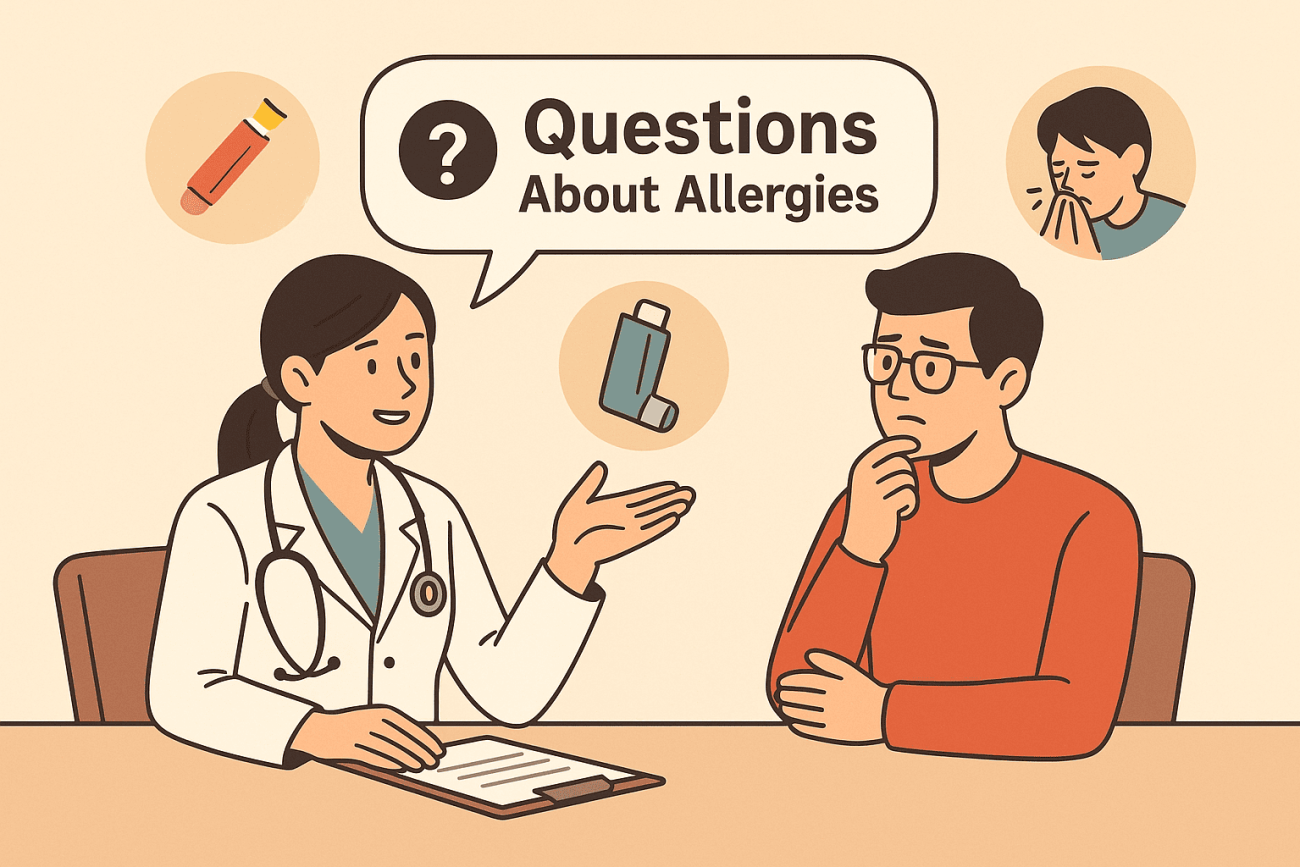Living with allergies can be challenging. That’s why asking the right questions about allergies is crucial for understanding and managing your condition successfully.
Because allergies can affect multiple body systems, it’s essential to be well-prepared when you meet with your allergist or immunologist.
Your allergist-doctor may only see you for a short time, but you have to manage your allergy 24 hours a day.
That’s why asking the right questions is critical to ensuring you fully understand your condition and know how to control it.
10 Essential Questions About Allergies You Should Always Ask
Understanding your allergies starts with asking smart questions. Here are the 10 key questions you should bring up at your next appointment.
1. What Are My Specific Allergens?
Understanding exactly what you’re allergic to is the foundation of allergy management.
Without clear knowledge of your allergens, it’s nearly impossible to avoid your triggers.
👉 Why it matters:
Avoidance is the first and most important step in managing any allergy — whether it’s food, environmental, or chemical.
2. What Treatments Are Best for Me?
There are often several treatment options available, including
-
Prescription medications
-
Lifestyle changes to minimize exposure
Discuss all your options. Some treatments may be more appealing, affordable, or less invasive than others.
3. Do I Need a Prescription, or Are There Alternatives?
Prescription drugs can be effective, but they also come with costs and potential side effects.
Ask your doctor:
-
Are there effective over-the-counter options?
-
Are there non-drug strategies I can use (like air purifiers, dietary adjustments, or allergen-proof bedding)?
🔗 Related: 12 Tips For Managing Seasonal Allergies
🔗 Related: Living With Food Allergies
4. Should I Avoid Certain Herbal Remedies, Supplements, or OTC Medications?
Many people are unaware that some supplements and herbal products can cause cross-reactions.
For example:
-
People allergic to ragweed may react to melons, chamomile, bananas, or sunflower seeds.
Always ask:
-
Are there herbs or foods I should be cautious about?
-
Can any medications interact negatively with my allergy treatments?
5. Will Allergy Shots Work for Me?
Allergy shots (immunotherapy) can be life-changing for many allergy sufferers — but they’re not for everyone.
Find out:
-
Will shots help with my specific allergies?
-
How often will I need them?
-
How long will the full treatment course last?
Understanding the commitment required is key.
6. Do I Need an EpiPen or Twin-Ject?
If you’ve experienced anaphylaxis (a severe allergic reaction) in the past, your doctor may recommend carrying an EpiPen.
Important to ask:
-
Do I need two doses? (Recent studies show that 1 in 4 people with food allergies require a second dose.)
-
Would a Twin-Ject — which contains two doses in one device — be better for me?
Knowing when and how to use a second dose could save your life.
7. Should I Wear a MedicAlert Bracelet?
A MedicAlert bracelet or pendant can literally save your life if you ever experience an allergic reaction and are unable to communicate.
Ask your doctor:
-
Should I get a bracelet indicating my allergies?
-
What specific information should it include (medications, foods, latex, etc.)?
8. How Can I Make My Home More Allergy-Proof?
Reducing allergens in your environment can significantly improve your symptoms.
Your doctor might have specialized advice depending on your allergies.
Meanwhile, you can also explore tips like:
-
Using HEPA filters
-
Washing bedding frequently
-
Avoiding carpeting
🔗 Related: 12 Tips For Managing Seasonal Allergies
🔗 Related: Managing Asthma During Allergy Season
9. I’m Allergic to My Pet — What Are My Options?
Giving up a beloved pet can be heartbreaking. Fortunately, it’s not always necessary.
Ask your doctor about:
-
Medications that might help you cope
-
Home adjustments to reduce allergens
-
Safe grooming practices
🔗 Related: Reducing Pet Allergens in Your Home
10. Are There Clinical Trials I Can Join?
Clinical trials offer access to new treatments and expert monitoring.
You may also receive free medications, devices, or even financial compensation.
Ask your allergist:
-
Are there trials that fit my condition?
-
What benefits and risks are involved?
Participating in a trial might give you early access to promising therapies!
Common Questions About Allergies and How to Manage Them
How can I find out exactly what I’m allergic to?
Your doctor can perform tests like skin prick testing or blood tests (IgE tests) to pinpoint specific allergens.
What should I do if I experience a severe allergic reaction?
Call emergency services immediately and use an EpiPen if you have one. Always follow up with a doctor.
Can allergies change over time?
Yes. Some allergies improve, worsen, or even change as you age. Regular checkups are important.
Asking the right questions about allergies can empower you to take control of your symptoms and live a healthier, more confident life.
Useful Resources:

